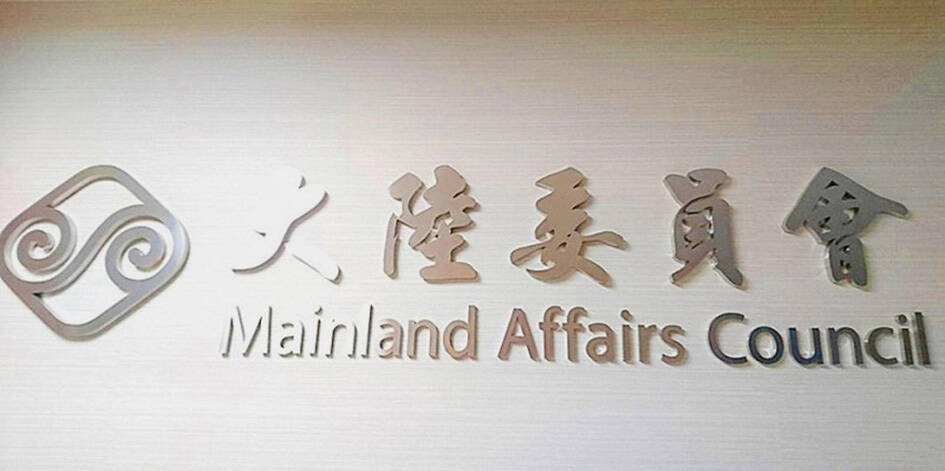China is likely to continue increasing its intimidation of Taiwan while expending “united front” efforts through cognitive warfare, a Mainland Affairs Council (MAC) report said yesterday.
The First-Quarter Report on the Situation in Mainland China cited Chinese Communist Party (CCP) No. 4 official Wang Huning (王滬寧) as saying at a meeting last week that China is to fully implement its “overall strategy” on Taiwan issues.
The strategy refers to what Chinese President Xi Jinping (習近平) said during the Chinese People’s Political Consultative Conference’s National Committee meeting and National People’s Congress in March that the CCP would firmly adhere to the “one China” principle and the so-called “1992 consensus,” resolutely opposing foreign interference and Taiwanese independence, the report said.

Photo: Chung Li-hua, Taipei Times
The report said that Chinese Minister of Foreign Affairs Qin Gang (秦剛) has said that Taiwanese independence forces are incompatible with peace and stability across the Taiwan Strait.
Chinese agencies including the Chinese Ministry of Foreign Affairs, the National People’s Congress’ Foreign Affairs Committee, the Taiwan Work Office of the CCP’s Central Committee and the Chinese Ministry of National Defense issued statements on April 6 criticizing President Tsai Ing-wen’s (蔡英文) April 5 meeting in the US with US House of Representatives Speaker Kevin McCarthy.
The Taiwan Work Office and the Taiwan Affairs Office (TAO) sanctioned Representative to the US Hsiao Bi-khim (蕭美琴), the Prospect Foundation and the Council of Asian Liberals and Democrats on April 7, the report added.
Beijing conducted three days of combat readiness patrols and “United Sword” operations around Taiwan from April 8, and the Chinese Ministry of Commerce launched an investigation into Taiwan’s trade restrictions on 2,455 Chinese products on April 12, it said.
China is intensifying its “united front” campaign, the report said, citing TAO Director Song Tao’s (宋濤) frequent meetings with Taiwanese to call for adherence to the “one China” principle and the “1992 consensus.”
The TAO lifted a ban on imports of fresh chilled beltfish and frozen Atlantic horse mackerel from Taiwan on March 15, and on April 1 removed requirements for a negative polymerase chain reaction test result within 48 hours before departure for cross-strait flight passengers, the report said.
China is also working to consolidate its “one China” framework internationally, it said.
Xi last month telling French President Emmanuel Macron and European Commission President Ursula von der Leyen that “expecting China to compromise on the Taiwan issue is wishful thinking” is an example of Beijing’s effort to strengthen its “one China” framework on the global stage, it said.
Chinese Central Foreign Affairs Commission Director Wang Yi (王毅) in February said that Taiwan has been part of China since ancient times and would never become a country, the report said.
The so-called “1992 consensus,” a term former MAC chairman Su Chi (蘇起) in 2006 admitted making up in 2000, refers to a tacit agreement between the Chinese Nationalist Party (KMT) and the CCP that there is “one China,” with each side having its own interpretation of what “China” means.
The Democratic Progressive Party has never acknowledged the existence of the “1992 consensus” or “one China” consensus.

Taiwan is stepping up plans to create self-sufficient supply chains for combat drones and increase foreign orders from the US to counter China’s numerical superiority, a defense official said on Saturday. Commenting on condition of anonymity, the official said the nation’s armed forces are in agreement with US Admiral Samuel Paparo’s assessment that Taiwan’s military must be prepared to turn the nation’s waters into a “hellscape” for the Chinese People’s Liberation Army (PLA). Paparo, the commander of the US Indo-Pacific Command, reiterated the concept during a Congressional hearing in Washington on Wednesday. He first coined the term in a security conference last

A magnitude 4.3 earthquake struck eastern Taiwan's Hualien County at 8:31am today, according to the Central Weather Administration (CWA). The epicenter of the temblor was located in Hualien County, about 70.3 kilometers south southwest of Hualien County Hall, at a depth of 23.2km, according to the administration. There were no immediate reports of damage resulting from the quake. The earthquake's intensity, which gauges the actual effect of a temblor, was highest in Taitung County, where it measured 3 on Taiwan's 7-tier intensity scale. The quake also measured an intensity of 2 in Hualien and Nantou counties, the CWA said.

The Overseas Community Affairs Council (OCAC) yesterday announced a fundraising campaign to support survivors of the magnitude 7.7 earthquake that struck Myanmar on March 28, with two prayer events scheduled in Taipei and Taichung later this week. “While initial rescue operations have concluded [in Myanmar], many survivors are now facing increasingly difficult living conditions,” OCAC Minister Hsu Chia-ching (徐佳青) told a news conference in Taipei. The fundraising campaign, which runs through May 31, is focused on supporting the reconstruction of damaged overseas compatriot schools, assisting students from Myanmar in Taiwan, and providing essential items, such as drinking water, food and medical supplies,

New Party Deputy Secretary-General You Chih-pin (游智彬) this morning went to the National Immigration Agency (NIA) to “turn himself in” after being notified that he had failed to provide proof of having renounced his Chinese household registration. He was one of more than 10,000 naturalized Taiwanese citizens from China who were informed by the NIA that their Taiwanese citizenship might be revoked if they fail to provide the proof in three months, people familiar with the matter said. You said he has proof that he had renounced his Chinese household registration and demanded the NIA provide proof that he still had Chinese